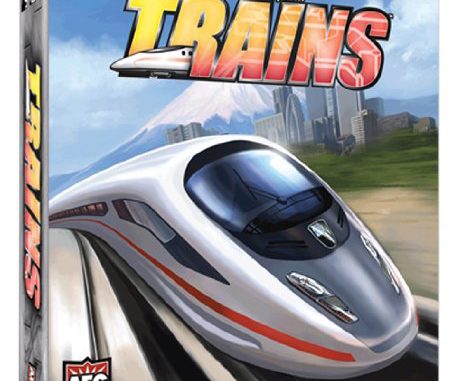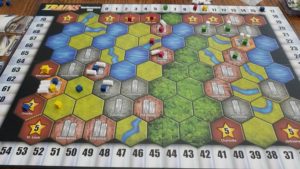
For the past few years, our regular game night has disappeared due to the presence of small children. We’re finally getting to the point where it might be possible to play games again. My son is old enough to play and our friend’s kids no longer require absolute attention. At a recent gathering we tried out the game Trains and it went pretty well.
 Trains is a deck building game with a similar feel to Dominion. There are different sets of cards you add to your deck that are randomized each time you play. It adds to this concept with a board that you are building trains on to gain victory points. Sadly, this is one of the game’s biggest shortcomings. Instead of little trains, like you might find in Ticket to Ride, you are merely placing little cubes.
Trains is a deck building game with a similar feel to Dominion. There are different sets of cards you add to your deck that are randomized each time you play. It adds to this concept with a board that you are building trains on to gain victory points. Sadly, this is one of the game’s biggest shortcomings. Instead of little trains, like you might find in Ticket to Ride, you are merely placing little cubes.
On your turn, you draw five cards and play what you can. Unlike Dominon, you are not limited in how many actions you take. Everything in your hand can be used.
There are five types of cards that you’ll collect. Blue trains are your money. You use these to buy other cards. More is good. There are also purple train station cards that allow you to build train stations in cities. Each city can have one to three stations, represented by the number of buildings showing on the cities tile. You get two points for each station, with bonus points if you are able to get a third.
The green cards are required to build new train routes. You need the card and money to build. It costs one money to build in a tile with most tiles requiring additional amounts. Cities, forests, and rivers all require one more. Additionally, it costs one per thing built in a tile. If someone already has a train station and a train in a city, it is going to cost four to for you to build there. Fortunately, some of the green cards you can buy negate these penalties. There are different cards that make it cheaper to build in cities or where other players have train.
There are also tiles on the board’s edge that are worth fixed amounts of points. Building on the board, on these tiles and cities with stations, will be the lions share of your final victory point total. There are also yellow cards, which are your straightforward victory point cards. They cost a lot to buy but give up to four victory points.
Red cards are the final card and are your action cards. They each allow you to gain more cards into your hand in some way. Some also give you money. This can allow for devastating chain reactions where action cards draw you more action cards, each giving you more money. In the game we played the winner used this to devastating effect. The rest of us were like twenty points behind him.
Overall it was a pretty fun game, despite the resounding defeat we received. The rest of us were pretty neck and neck though so if we had caught onto the value of action cards earlier before he had bought them all, we could have had a fairer game. But I’m partial to deck building game.
Wayne Basta
Latest posts by Wayne Basta (see all)
- X-Wing Tier List – Rebels - May 10, 2023
